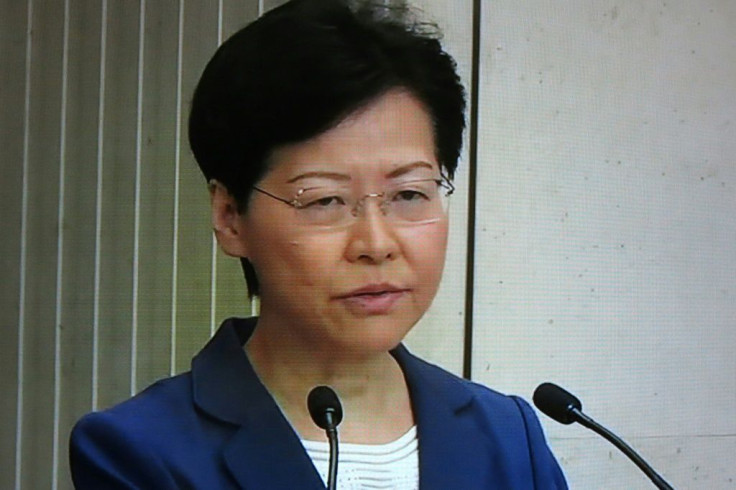Hong Kong Leader Carrie Lam Would Quit, But Serving Two Masters Has 'Limited' Options

Trapped between the Hong Kong protestors and China, besieged Hong Kong chief executive Carrie Lam is reaching breaking point.
In telling statements caught on a 24 minute-long audio recording, Lam lamented her unenviable position and said she’d quit if she could. She also regretted having caused "unforgivable” havoc by igniting the ongoing political crisis marked by a non-stop string of street protests for the past 13 weeks.
“For a chief executive to have caused this huge havoc to Hong Kong is unforgivable,” Lam said in English, in a message she gave to a group of businesspeople.
"If I have a choice, the first thing is to quit, having made a deep apology."
Lam is reviled by many of her countrymen for being a witting puppet of Beijing. Many protestors have held aloft placards denouncing her as “Carrie Lame” in reference to her pro-Beijing allegiance.
Lam also told the people at this closed-door meeting she now has "very limited" room to resolve the crisis because this issue has been elevated “to a national level ... to a sort of sovereignty and security level” involving China.
This threat is being exacerbated by the trade war against China launched a year ago by president Donald Trump.
In a situation such as the one she faces, “the room, the political room for the chief executive who, unfortunately, has to serve two masters by constitution, that is the central people’s government and the people of Hong Kong, that political room for maneuvering is very, very, very limited.”
Political analysts see Hong Kong’s unrelenting street protests in defiance of China as China’s biggest political upheaval since the Tiananmen Square protests of 1989. Others fear Hong Kong’s increasingly rowdy protestors, most of of whom are young people, might meet a fate similar to that of the pro-democracy advocates at Tiananmen who were shot dead in a Chinese attack.
Lam’s position isn’t being helped by leaks to media affirming China is effectively calling the shots on handling the relentless crisis in Hong Kong. This upheaval is now the greatest threat to the leadership of president Xi Jinping and his promise of economic progress and social stability.
The massive protests began in June as Hong Kongers united to defy a proposed extradition law by Lam’s administration that would have allowed people suspected of crimes on the mainland to be extradited to face trial in Chinese courts. The law has been shelved but not rescinded altogether.
Media reports said Beijing rejected a recent proposal by Lam to defuse the crisis by withdrawing the extradition bill.
Hong Kong’s protesters now want the complete withdrawal of the extradition proposal, which Lam has resolutely refused given China’s similar stand.
In the audio, Lam said she believes Beijing hasn’t reached a turning point where it believes military force is the only option left to quell the protests. She said Beijing hasn’t imposed any deadline for ending the crisis ahead of National Day celebrations on Oct, 1 marking the 70th founding anniversary of the People’s Republic of China.
She affirms China had “absolutely no plan” to deploy People’s Liberation Army troops to quash the protests.
“They know that the price would be too huge to pay,” she said.
“They care about the country’s international profile. It has taken China a long time to build up to that sort of international profile and to have some say, not only being a big economy but a responsible big economy, so to forsake all those positive developments is clearly not on their agenda.”
She believes China is “willing to play long” to ride-out the crisis.
In a nod to her police, Lam spoke about her frustration with not being able “to reduce the pressure on my frontline police officers,” or to provide a political solution to “pacify the large number of peaceful protesters who are so angry with the government, with me in particular.”
Her inability “to offer a political situation in order to relieve the tension,” she said, was the source of her “biggest sadness.”
© Copyright IBTimes 2025. All rights reserved.





















